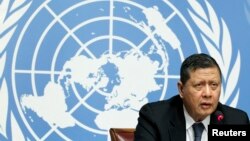A United Nations human rights investigator on Thursday raised concerns that North Korea has forced more than 50,000 people to work abroad and urged countries where they have been sent, mainly Russia and China, to grant him access to investigate.
Marzuki Darusman, U.N. special rapporteur on the Democratic People's Republic of Korea (DPRK), told a U.N. General Assembly committee that the North Koreans worked overseas "under overall conditions that reportedly amount to forced labor."
"The rationale behind that state-sponsored system appears to be to circumvent United Nations sanctions imposed on the country with a view to earning currencies," Darusman wrote in a report he presented to the U.N. committee on Thursday.
Alleged to make billions
"It is believed that the government of the Democratic People's Republic of Korea earns through that system between $1.2 billion and $2.3 billion per year," he wrote, adding that they worked mainly in mining, logging, textile and construction.
North Korea is under U.N. sanctions for carrying out nuclear tests and missile launches. In addition to an arms embargo, Pyongyang is banned from trading in nuclear and missile technology, and is not allowed to import luxury goods.
The U.N. Security Council added the issue of human rights in North Korea to its agenda in December, after a U.N. Commission of Inquiry report last year detailed abuses in the impoverished Asian country that it said were comparable to Nazi-era atrocities.
"The human rights situation in the Democratic Peoples of Korea has more or less remained the same," Darusman told the U.N. committee.
Darusman said the majority of North Koreans were sent to Russia and China to work, but could also reportedly be found in Algeria, Angola, Cambodia, Equatorial Guinea, Ethiopia, Kuwait, Libya, Malaysia, Mongolia, Myanmar, Nigeria, Oman, Poland, Qatar and the United Arab Emirates.
'Unacceptable system'
He called on those countries to grant him access to verify allegations and warned that companies hiring North Koreans "become complicit in an unacceptable system of forced labor."
Officials at China's and Russia's missions to the United Nations were not immediately available for comment on Darusman's request.
North Korea's Deputy U.N. Ambassador to the United Nations in Geneva, Choe Myong Nam, rejected Darusman's report, telling the U.N. committee on Thursday it was an "extreme manifestation of politicization, selectivity and double standards and no relevance whatsoever with genuine human rights."
Darusman encouraged the U.N. special rapporteur on contemporary forms of slavery, Urmila Bhoola, to also investigate the issue of North Korean workers abroad.





